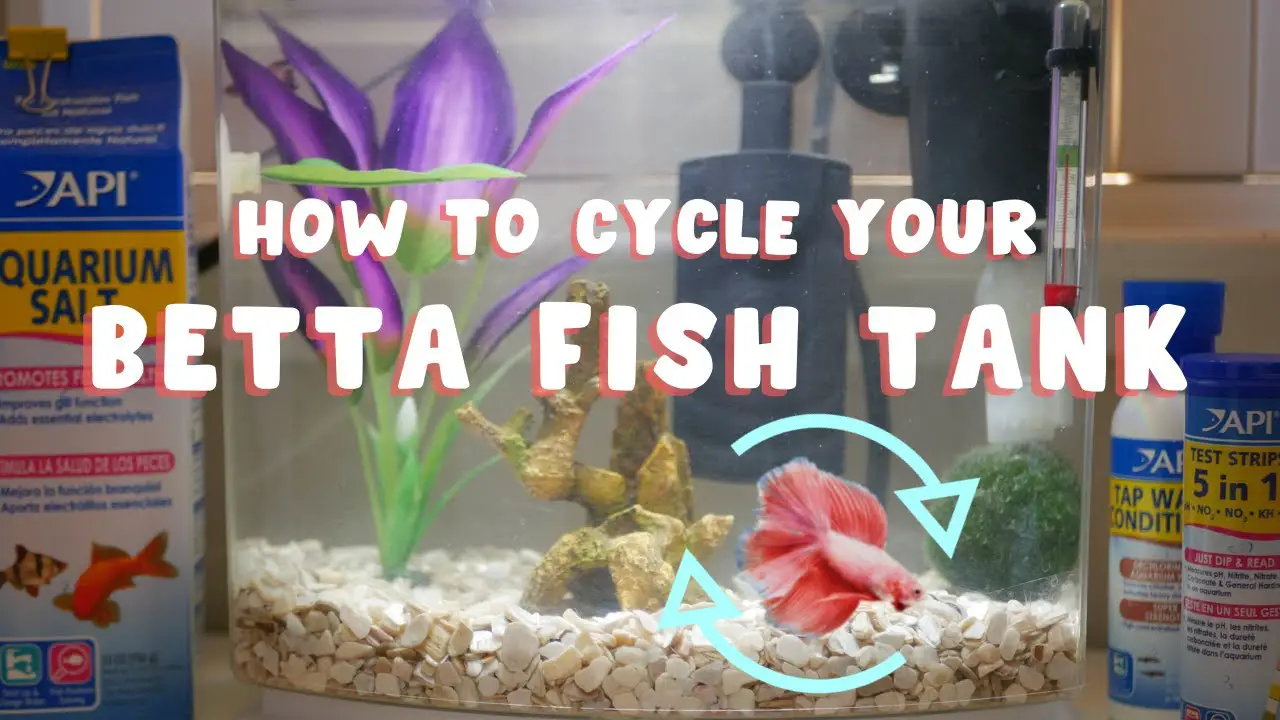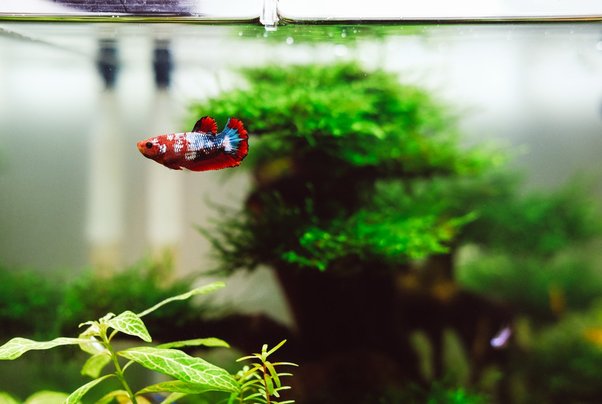Betta fish are one of the most popular aquarium fish worldwide due to their vibrant colors and unique personalities. However, many new betta fish owners often wonder about the tank cycle and if their fish can survive it. In this article, we will explore the topic of whether betta fish can survive a tank cycle and provide you with everything you need to know to ensure your betta fish thrives in its new home.
The tank cycle is an essential process that establishes a healthy environment for your betta fish to live in. While it may seem daunting, understanding the tank cycle is crucial for maintaining the well-being of your fish. So, let’s dive in and explore whether betta fish can survive a tank cycle and what steps you can take to ensure their survival.
Yes, a Betta fish can survive a tank cycle, but it is not recommended. Tank cycling is the process of establishing beneficial bacteria in a new aquarium to break down toxic waste. During this process, ammonia and nitrite levels can spike, which can be harmful or even deadly to fish. It is best to cycle the tank before adding fish or use a fishless cycling method. If you must add a Betta during the cycling process, closely monitor water parameters and perform frequent water changes.

Can a Betta Fish Survive a Tank Cycle?
As a betta fish owner, it’s essential to understand the importance of tank cycling. But what happens if you didn’t cycle your tank before adding your betta fish? Can a betta fish survive a tank cycle? Let’s find out!
What is Tank Cycling?
Tank cycling is the process of establishing beneficial bacteria in your aquarium’s filter media. These bacteria convert harmful toxins such as ammonia and nitrite into less harmful nitrate. This process takes anywhere from 4-8 weeks, and it’s essential for the health and well-being of your aquarium’s inhabitants.
When you add a betta fish to an uncycled tank, harmful toxins will quickly build up. Ammonia is highly toxic to fish, and even low levels can cause stress and illness. Nitrite is also toxic and can lead to fish death. Therefore, it’s crucial to cycle your tank before adding any fish to avoid these problems.
Can a Betta Fish Survive an Uncycled Tank?
While it’s not ideal, a betta fish can survive in an uncycled tank if proper measures are taken. The key is to keep the water as clean as possible to prevent toxin build-up. Here are some steps to take:
| Step | Description |
|---|---|
| Perform frequent water changes | Regular water changes will help remove harmful toxins from the water. Do a 25% water change every other day. |
| Test water parameters | Use a water test kit to monitor ammonia, nitrite, and nitrate levels. If ammonia or nitrite levels spike, do an immediate water change. |
| Use a water conditioner | A water conditioner will help neutralize harmful toxins in the water and make it safe for your betta fish. |
Following these steps will help keep your betta fish healthy and safe in an uncycled tank. However, it’s essential to start the cycling process as soon as possible to ensure long-term health.
The Benefits of Cycling Your Tank
Cycling your tank has many benefits for both your betta fish and the overall health of your aquarium. Here are some benefits:
- Establishes a healthy biological filter
- Reduces stress on fish
- Prevents harmful toxin build-up
- Increases water quality and clarity
- Encourages the growth of beneficial bacteria
Overall, cycling your tank is crucial for the long-term health and well-being of your betta fish. While they can survive in an uncycled tank, it’s not ideal, and it’s essential to start the process as soon as possible. By following the steps outlined above, you can help keep your betta fish safe and healthy until your tank is fully cycled.
Cycling Your Tank vs. Fish-In Cycling
There are two methods for cycling your tank: traditional cycling and fish-in cycling. Traditional cycling involves adding ammonia to your tank and waiting for beneficial bacteria to establish. Fish-in cycling involves adding fish to the tank and allowing their waste to generate ammonia, kickstarting the cycling process.
While fish-in cycling can be faster, it’s not recommended as it’s stressful and harmful to your fish. Traditional cycling is the preferred method as it’s safer and less stressful for your betta fish.
In conclusion, a betta fish can survive in an uncycled tank, but it’s not ideal. Cycling your tank is crucial for their long-term health and well-being. By following the steps outlined above, you can help keep your betta fish safe and healthy until your tank is fully cycled.
Frequently Asked Questions
Betta fish are popular and beautiful fish to keep as pets. However, it is important to understand the process of tank cycling to ensure the survival and well-being of your fish. Here are some common questions about whether a betta fish can survive a tank cycle.
What is tank cycling and why is it important?
Tank cycling is the process of establishing beneficial bacteria in the aquarium to help break down fish waste and other organic matter. This bacteria is essential to maintain good water quality and prevent harmful toxins from building up in the tank. Without proper cycling, the water quality can quickly degrade and harm the fish.
It is important to cycle your tank before adding any fish, including betta fish. This allows the bacterial colony to establish itself and maintain a healthy environment for your fish.
Can a betta fish survive a tank cycle?
Betta fish can survive a tank cycle, but it can be stressful for them and put them at risk for health problems. The high levels of ammonia and nitrites during the cycling process can cause respiratory distress, fin rot, and other issues. It is recommended to do a fishless cycle or use hardy fish like zebra danios to cycle the tank before adding a betta fish.
If you must add a betta fish during the cycling process, closely monitor the water parameters and perform frequent water changes to keep the levels as low as possible. It is also important to provide plenty of hiding places and clean, warm water to reduce stress on the fish.
What are the signs that a betta fish is stressed during a tank cycle?
Signs that a betta fish is stressed during a tank cycle include gasping for air at the surface, lethargy, loss of appetite, and fin rot. The high levels of ammonia and nitrites can damage the betta fish’s gills and make it difficult for them to breathe. It is important to closely monitor the water parameters and provide a stress-free environment for the fish.
If you notice any signs of stress, perform a water change immediately and consider moving the betta fish to a separate tank until the cycling process is complete.
How long does tank cycling take?
Tank cycling can take anywhere from 2 to 6 weeks, depending on the method used and the size of the tank. It is important to be patient and not rush the process, as a stable bacterial colony is essential for the long-term health of your fish.
During the cycling process, test the water frequently to monitor the levels of ammonia, nitrites, and nitrates. Once the levels of ammonia and nitrites have dropped to zero and nitrates are present, the tank is cycled and ready for fish.
What can I do to speed up tank cycling?
There are a few things you can do to speed up tank cycling, such as using a bacterial supplement, adding live plants, and increasing the water temperature. Bacterial supplements contain beneficial bacteria that can help establish the colony faster. Live plants can also help absorb nitrogen compounds and provide a food source for the bacteria.
Increasing the water temperature to around 80°F can also speed up the cycling process, as bacteria grow faster in warmer water. However, it is important to not raise the temperature too high, as this can stress or harm the fish.

How to Cycle Betta Fish Tank (COMPLETE BEGINNER’S GUIDE in 3 Min)
In conclusion, the answer to the question of whether a Betta fish can survive a tank cycle is yes, but with some important considerations. Firstly, it’s crucial to ensure that the tank is properly cycled before introducing any fish, including Betta fish. This process takes time and patience, but it’s essential for creating a healthy and stable environment for your fish.
Secondly, it’s important to monitor the water conditions regularly, especially during the initial stages of the tank cycle. Testing the water regularly will allow you to catch any potential issues before they become a problem for your fish.
Lastly, providing your Betta fish with a healthy diet and appropriate care will also ensure their survival during the tank cycle. By following these tips, you can successfully help your Betta fish survive a tank cycle and thrive in their new environment.
